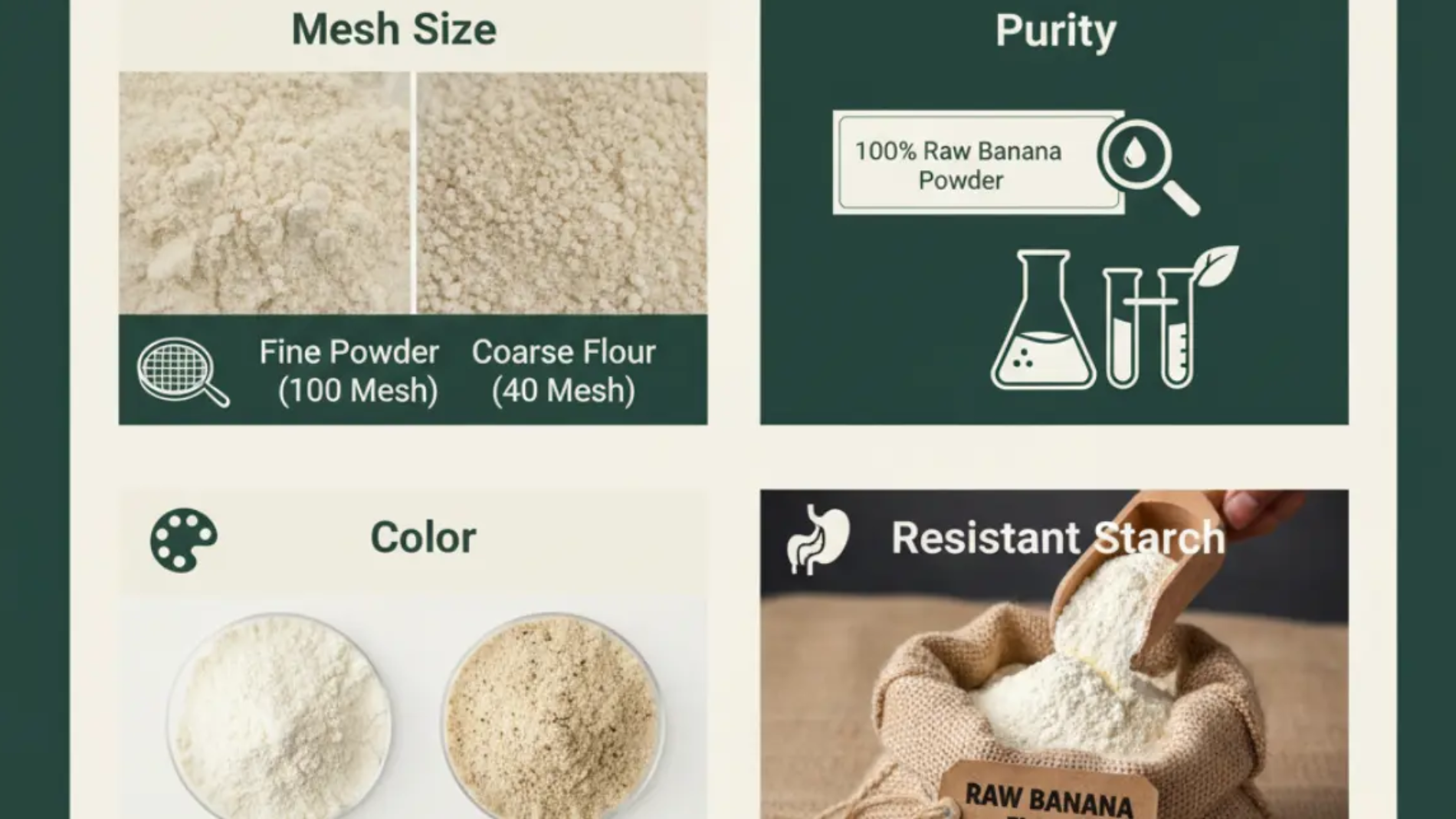The demand for functional, clean-label ingredients has skyrocketed, and leading the charge is raw banana powder. This powerhouse food ingredient, also known as green banana flour, is being actively sought by R&D teams and purchasing managers in the health food, gluten-free, and nutraceutical industries.
However, sourcing raw banana powder is a technical purchase. Unlike ripe banana powder, which is used for sweetness, raw banana powder is a functional ingredient prized for its starchy, neutral profile. For a product formulation to be successful, the powder must meet exact specifications. A slight variation in “mesh size,” “purity,” or “color” can drastically alter the texture, taste, and stability of a final product.
As an experienced Indian banana powder exporter, we understand that these details are not just details—they are everything. This guide will walk you through the three most critical technical specifications to look for when sourcing.
First, Why "Raw"? The Resistant Starch Factor
Before diving into the specs, it’s crucial to understand why you are sourcing “raw” powder. This ingredient is made from unripe, green bananas. Because they are not ripe, their sugar content is low, and their starch content is high.
Specifically, they are rich in Resistant Starch (RS2). This is the key functional benefit. Resistant starch acts as a prebiotic fiber, supporting gut health and managing blood sugar. This makes it a star ingredient for:
Gluten-free baking (as a gluten-free flour)
Smoothie mixes and protein blends
Nutraceutical and “gut health” products
Baby food formulations
Understanding this a-priori helps you to understand why the following specifications are so critical.
Spice Up Your Business with Authentic Indian Flavors
Import and Export Excellence from India!

1. Mesh Size: The Key to Texture and Application
What it is: “Mesh size” (or particle size) refers to the fineness of the powder. It’s measured by its ability to pass through a specific-sized screen. A high number (e.g., 100 mesh) means a very fine powder, while a low number (e.g., 40 mesh) means a coarser, more granular powder.
Why it matters: The mesh size dictates the powder’s performance.
For Beverages & Smoothies (e.g., 80-100 Mesh): A fine powder is essential. It ensures better solubility and dispersibility in liquids, preventing a “gritty” or “sandy” mouthfeel. This is a non-negotiable for protein blends, meal replacements, and instant mixes.
For Baking (e.g., 40-60 Mesh): A slightly coarser granulation is often preferred. It mimics the texture of traditional wheat flours, providing a better structure and crumb in gluten-free breads, muffins, and cookies.
When sourcing raw banana powder, don’t just ask for “powder”; specify the mesh size that your application demands.
2. Purity: The "Clean Label" and Safety Guarantee
What it is: Purity, in this context, has two meanings: 1) freedom from adulterants, and 2) microbiological safety.
Why it matters: Today’s consumers are label-readers. Your product’s “clean label” appeal depends on the purity of its ingredients.
Adulteration: Because it’s a valuable flour, low-quality raw banana powder can be cut with cheaper starches or flours (like rice or tapioca). This dilutes the resistant starch content and compromises the nutritional profile. Your supplier must guarantee 100% pure banana powder.
Microbiological Safety: As a raw agricultural product, it must be tested and confirmed free from pathogens like Salmonella, E. coli, and Coliforms, and have a low overall plate count.
When sourcing, you must demand a Certificate of Analysis (COA) that verifies 100% purity and provides a clean microbiological report.
3. Color: The Visual Indicator of Quality and Process
What it is: A visual inspection of the powder. This is the fastest way to judge the quality of a sample.
Why it matters: The color of raw banana powder tells you exactly how it was processed. Many first-time buyers make the mistake of looking for a yellow, “banana-like” color. This is incorrect.
What You WANT (The Correct Color): A high-quality raw banana powder should be a pale, off-white, beige, or light greyish color. This indicates that unripe, starchy bananas were used and that they were dried correctly (e.g., spray-dried) at a controlled temperature.
What You DON’T WANT (Red Flags):
Yellow/Brown Color: This means ripe, sugary bananas were used, or the powder was “scorched” at a high temperature during drying. It will have a sweet, burnt taste and will lack the resistant starch you’re paying for.
Dark Specks: An excessive amount of black or brown specks can indicate the inclusion of skins or defects.
A good banana powder supplier will proudly provide a sample that is pale and consistent, a true indicator of its “raw” and “unburnt” quality.
Spice Up Your Business with Authentic Indian Flavors
Import and Export Excellence from India!

Sourcing with Confidence
Sourcing raw banana powder is a technical decision that directly impacts the quality of your final product. A “cheap” powder that fails on any of these three specifications—mesh, purity, or color—will ultimately fail in your formulation.
The key to success is to partner with a supplier who understands these banana powder specifications as well as you do. A reliable partner will be transparent, provide all necessary documentation (especially the COA), and be able to supply a consistent product, batch after batch.
Frequently Asked Questions (FAQs)
1. What is the main difference between raw and ripe banana powder?
Raw banana powder (or green banana flour) is starchy, not sweet, and used as a functional flour rich in resistant starch. Ripe banana powder is sweet, has a strong banana flavor, and is used as a natural sweetener and flavoring agent.
2. What is a Certificate of Analysis (COA)?
A COA is a lab report from the manufacturer or a third party that verifies the technical specifications of a specific batch of product. It is your guarantee that the powder meets the specs for purity, moisture, microbes, and more.
3. What is the typical shelf life of raw banana powder?
When processed to a low moisture content (typically < 8%) and stored in a cool, dry place in airtight packaging, export quality banana powder can have a shelf life of 12 to 24 months.
4. Can I get a certified organic version?
Yes. Many leading Indian banana powder suppliers offer certified organic options (e.g., USDA, EU Organic) for brands that require a fully organic and non-GMO product line.
5. Is raw banana powder truly 1:1 gluten-free flour replacement?
Not exactly. Due to its high starch content, it’s very absorbent. Most bakers find it works best when it replaces 25-30% of the total flour in a recipe, or when blended with other gluten-free flours.
6. Does the drying process (spray-dried vs. drum-dried) matter?
Yes. Spray-drying often produces a finer, more soluble powder that is ideal for beverage mixes. Drum-drying can be more cost-effective. The best method depends on your final application.
7. Why is India a good region for sourcing banana powder?
India is one of the world’s largest producers of bananas. This provides a massive, consistent, and cost-effective supply of raw materials for producing high-quality dehydrated products.
8. Will raw banana powder make my product taste like bananas?
No. This is a key benefit. Because it’s made from unripe bananas, it has a very neutral, slightly earthy, and “flour-like” taste, making it an excellent invisible ingredient in both sweet and savory applications.
About us
We bridge the gap between local producers and global markets, ensuring seamless trade facilitation with exceptional quality and reliability. We provide quick delivery services with customized packaging with all approval of International Certificates (Spices board India, MSME, IEC, fssai, FIEO, APEDA, EU certification, FDA and Many More)
Contact us
Shop No. 3, Ganesh Prestige Sr. No. 2/15, Near Laxmi Jewellers, Dhanakawadi, Pune – 411043, Maharashtra INDIA.
Call On
+91 9545205050
+91 9822422584



Leave A Comment